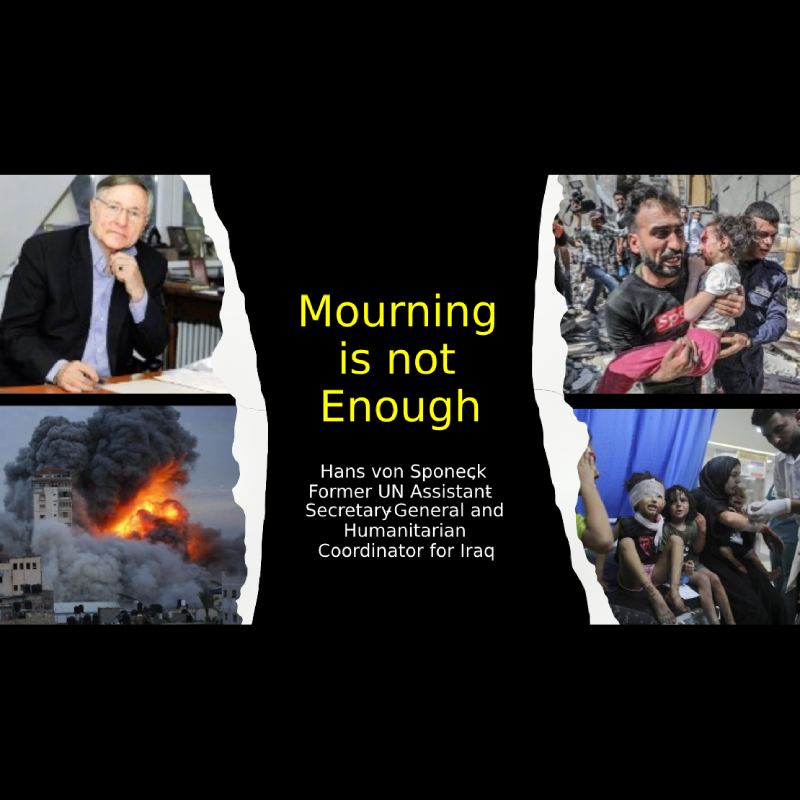
Hans von Sponeck, Former UN Assistant-Secretary-General and Humanitarian Coordinator for Iraq, expresses his outrage about the hypocrisy of heads of state and foreign ministers flocking to Tel Aviv with one-sided messages and adding the fig leaf not to forget humanitarian aid and completely ignoring the context, the ‘why’ it all happened. (5/11/2023)
元国連事務次長補でイラク担当人道調整官のハンス・フォン・スポネック氏は、テルアビブに群がる各国首脳や外相らが一方的なメッセージを掲げ、人道支援を忘れないようイチジクの葉を付け加えたような偽善な態度に対して怒りを表明した。それは「なぜ」このような惨事が起こったのかを完全に無視しているからであると指摘している。 (2023/5/11)
Hans von Sponeck, ancien secrétaire général adjoint de l’ONU et coordinateur humanitaire pour l’Irak, exprime son indignation face à l’hypocrisie des chefs d’État et des ministres des Affaires étrangères affluant à Tel Aviv avec des messages unilatéraux et en ajoutant une feuille de vigne pour ne pas oublier l’aide humanitaire et ignorant complètement le contexte, le « pourquoi » tout cela s’est produit. (11/05/2023)
Mourning is not Enough.
War – war was part of the first years of my life. I have felt war. My father was executed in 1944, my grandfather died as a prisoner of war, my half-brother lost his life on the eastern front, my mother escaped from an internment camp, and my grandmother and I saw the end of the war in a hide-out at what became the border between two Germanies.
As I grew older, I was eager, very eager, to understand what could prevent war. Young as I was, it was not yet clear to me what this entailed. In 1957, I was seventeen at the time, I was offered a travel scholarship by the French Zelidja Foundation and my German boarding school, Salem, to support the plan I had to go to Israel to meet German Jews who had escaped from the area where my school was located and found refuge in Israel.
I wanted to understand how they had started their new life as survivors from my country. I wanted to join them, and this was for more than one reason: to be there and to share their effort to settle. A German cargo ship brought me from Hamburg to Haifa – what freight it carried, I do not remember, maybe some goods that symbolized that there was a future between Germany and Israel.
The innocence of my age protected me during this visit against the burden of guilt. Tel Adashim, a moshav or farming community, gave me the opportunity to meet with people who had at one time been fellow Germans. They were kind to me and allowed me to get a glimpse of their new life. In two Kibbutzim, Ein Gedi, and Ein Gev, both in the Dead Sea area, I encountered a more difficult reality. It was not the toughness of the work in the fields that was a challenge, it was the horrors of the experience of the older kibbutzniks that were written on their faces and the reservation of the younger, the sabers, the locally-born Israelis towards me, a young German who had come to try to understand. What remains very clearly in my memory is the immense optimism the Israelis I met all had in building a life based on peace and tranquility. I knew nothing of the plight of the Palestinians.
This is not the place to review decades of opportunities various Israeli governments have missed to build upon these initial years of the young country and accept the UN General Assembly’s decision of 1947 to have a Jewish and an Arab state in the former British Protectorate of Palestine. I want to recall what Albert Einstein wrote to Chaim Weizman in 1929, who later became Israel’s first president: “Should the Jews not learn to live in peace with the Arabs, then we have learnt nothing during the 2000 years of suffering and deserve all that will come to us.” How dare I, as a non-Jew, include such a quote? To do so is not an antisemitic outburst on my part. I am ardently pro-semitic partially because Palestinians and Israelis are both of Semitic origin unless Shem, the son of Noah, is no longer considered an ancestor of Jews and Arabs. My heart aches and my mind is determined to speak out.
The condemnation by the UN Secretary-General Guterres of the horrific acts by Hamas and at the same time, his reminding the world that the Palestinian people have had to endure 56 years of suffocating occupation while their land was devoured by illegal settlements took courage but was the right thing to do. The brutality of the IDF response to the brutality of the Hamas attack both constitute severe violations of international humanitarian law for which they must be held accountable. While law has no feelings, innocent citizens of Palestine and Israel have feelings, yet no choice but to suffer.
The UN Security Council was created after the Second World War to function as a team able to find compromises and negotiate solutions and not act as national adversaries that add fuel to the fire. Yet, the US and the Russian draft resolutions currently before the Security Council demonstrate that geopolitical interests are more important than ending the carnage and fulfilling their mandate to prevent war and find solutions for peace.
As a former UN civil servant who has seen at close range how the world of power handled Iraq in the previous century, I am outraged by the hypocrisy of heads of state and foreign ministers flocking to Tel Aviv with one-sided messages and adding the fig leaf not to forget humanitarian aid. Completely ignored is the context, the ‘why’ it all happened. Are pictures of the Supernova Sukkot Gathering, Gaza City, and Khan Younis not enough to instill a sense of urgency, of compassion, and an imperative to replace hollow rhetoric with concrete measures that will make a difference whether Palestinians and Israelis alike survive or die?
Hans von Sponeck
Former UN Assistant-Secretary-General and Humanitarian Coordinator for Iraq.
PGPF International Advisor.